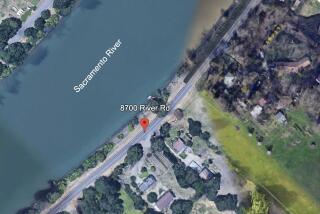Death Penalty for Killer of Fisherman Upheld by High Court
SAN FRANCISCO — The state Supreme Court upheld the death penalty Thursday for the convicted killer of a fisherman slain on the banks of the Tuolumne River, rejecting claims that the defendant’s life should be spared because neither of his two accomplices was sentenced to die.
In a 6-1 decision, the court affirmed the death sentence of Keith Edward Adcox, 27, for what it called the “senseless, pitiless” 1982 ambush attack committed, in part, for money to satisfy a 16-year old cohort’s craving for a cinnamon roll.
The ruling, issued in a 93-page opinion by Justice David N. Eagleson, followed past court decisions where the justices have refused to set aside a death sentence because others involved in the crime received lesser penalties.
But in dissent, Justice Stanley Mosk contended that the actions of the accomplices were “scarcely less serious” than those of Adcox and that, because the penalties were disproportionate, he should have been sent to prison as were the others.
And in another separate opinion, Justice Allen E. Broussard, while agreeing that the death sentence should be upheld, called the result troubling and argued that Adcox would never have faced execution had the killing occurred in a more populated area, where many more such cases arise.
Because capital trials are far more expensive than ordinary murder cases, urban authorities seek the death penalty only under certain local guidelines, Broussard observed.
“Those guidelines and practices vary so greatly from county to county that we have, in effect, 58 death penalty laws, and in many cases whether a defendant gets the death penalty will depend on where he committed the crime,” the justice said.
“Unfortunately for (Adcox), he committed his crime in a rural county where murders are less frequent, and in which it is possible for the prosecutor to seek a death penalty in all or most death-eligible cases.”
The case arose in May, 1982, when Adcox, then 20; Annette Tillery, his 16-year old girlfriend; and Howard Love, 18, left Modesto to go on a camping trip. Adcox took along fishing gear and a .22-caliber rifle.
According to testimony, the three lived on beans, potatoes and fish for several days and then Tillery announced she wanted cinnamon rolls, suggesting they attack a fisherman to get some money. Finally, the two men--Adcox carrying the rifle and Love armed with a club--set off to trail a fisherman they had seen on the river earlier.
After 30 minutes or so, Adcox and Love came running back, Adcox declaring, “Let’s get out of here.”
Later, the fisherman, David L. Orozco, was found dead of a gunshot that struck him in the back of the head, apparently as he was kneeling to bait his fishhook.
Authorities said the assailants emptied Orozco’s wallet of $30 in cash and stole several items from his car, including a baby carrier, before abandoning it in a canal.
At trial, Tillery was granted immunity and testified for the prosecution. She said Adcox had admitted shooting Orozco and had described the killing as horrible, with the victim’s “blood bubbling out of his nose and mouth.”
Adcox denied committing the killing, saying he had “sort of tossed” the rifle to Love and run from the scene before Love shot Orozco.
A Tuolumne County Superior Court jury convicted Adcox of the murder and returned the death sentence. In separate proceedings, Tillery pleaded guilty in juvenile court to robbery and was sentenced to the California Youth Authority. Love was convicted of murder and sentenced to life in prison.
In its ruling Thursday, the high court rejected Adcox’s contention that his sentence was disproportionate to those of his accomplices, thus violating constitutional prohibitions against cruel and unusual punishment.
More to Read
Sign up for Essential California
The most important California stories and recommendations in your inbox every morning.
You may occasionally receive promotional content from the Los Angeles Times.









